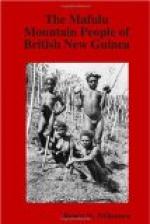It seemed to me at first, as regards these sorcerers, that there was a confusion in the Mafulu mind between divination and causation. The question as to this arose specially in connection with the ceremony for ascertaining whether a chief was or was not going to die. The people of a clan and the ailing chief certainly assume that the sorcerers who perform the ceremony under instructions, whether they be of the same community or of some other community, will by their magical powers merely divine the death or recovery of the chief; and the idea does not enter their heads that these sorcerers may actually cause the death. And yet they will accuse a hostile sorcerer of causing the death by an exactly similar ceremony, and will go to war over the matter. Probably, however, it is rather a question of the sorcerer’s assumed volition—that is, it is assumed that the friendly sorcerer does not want the chief to die, and the people rely upon him to confine himself to a divination ceremony, and not to engage in hostile sorcery; whereas a hostile sorcerer might do the latter. I may add that I was led to suspect that the burning test was regarded as being only a matter of divination, and that the causation, if it occurred, was effected by means of the previous incantation.
There are also, besides the sorcerers, a number of specialists, who can hardly perhaps be called true sorcerers, but who have certain specific powers, or are acquainted with certain specific forms of incantation, and whose services are from time to time sought by the people. It is impossible for me to point to any definite line of demarcation between the true sorcerers and these smaller people; and it cannot be doubted that the powers of the latter, like those of the former, are, or have been, based upon the supernatural, even though they themselves do not claim to be and are not regarded as being magic men in the highest sense. I think I may regard them as being more or less the Mafulu equivalents of the Roro individuals whom Dr. Seligmann calls “departmental experts.” [112]
Dealing first with the true sorcerers, they undoubtedly include among their number the men who perform the special ceremonial already described for ascertaining whether a sick chief is or is not destined to die. They also seem to include the makers or providers of the various charms, including those which are carried in the little charm bags and the love charms used by young men, as already mentioned. There are also two other matters which are regarded as coming within the province of the true sorcerers, of which one relates to rain and the other relates to illness and death. I will deal with them separately.




